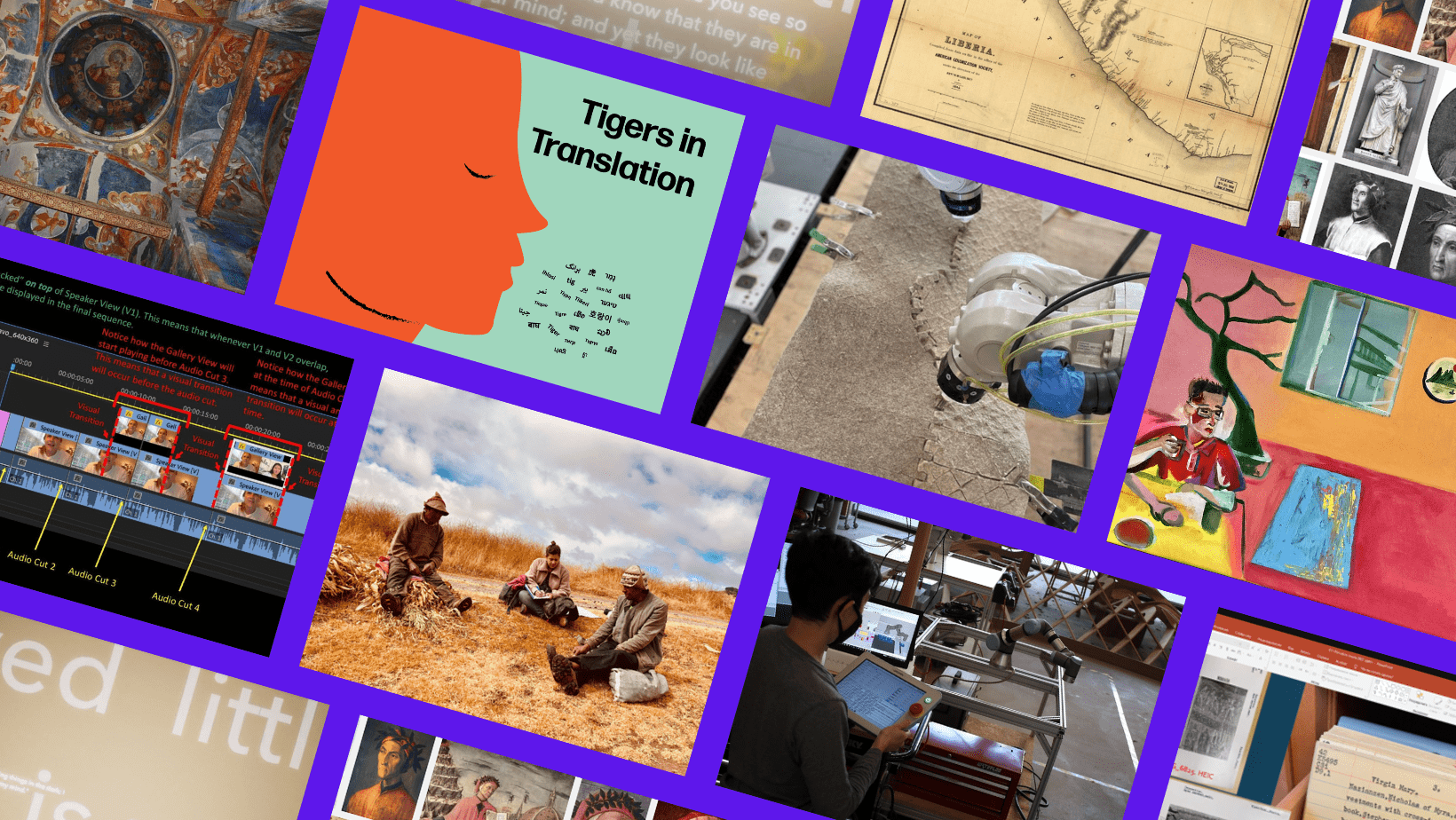The Humanities Council has awarded 2024 Flash Grants to 12 University faculty and staff for eight first-time initiatives. The mini-grants for innovation, ranging from $500 to $5,000, experiment with humanities research and teaching, and enrich the campus or classroom experience for students.
Flash Grants are supported by the Humanities Council Magic Project, thanks to the generosity of Lynn Shostack, in memory of her husband, David A. Gardner ’69.
Projects will examine new uses of artificial intelligence in language learning and library cataloguing, uncover lost Byzantine archives, encourage zine-making on campus, and examine digitized reports related to convict labor. Grants will also support creative new approaches to contemporary dance and science exploration.
Brief descriptions of the projects are below.
Library Zine Cart
Ariel Ackerly (Princeton University Library); Molly Dotson (Princeton University Library)
This grant supports the purchase of equipment and materials necessary to assemble the Princeton University Zine Cart, which will be used by students, departments, and professors in classroom environments. The cart will be housed in the PUL Makerspace and will come with example lesson plans for classroom activities and ideas for assignments that may engage students with historical self-publishing practices, personal self-reflective exercises, or other critiques of knowledge sharing.
Plantation Imaginaries: Art, Landscape, and Repair
Anna Arabindan-Kesson (Art & Archaeology; African American Studies)
This grant will support enhancements to a Spring 2025 graduate course that focuses on the representation of the plantation in visual and literary texts across the former British Empire. Students will engage with colonial sources, literary texts, and contemporary art. It will support the work of curator and writer Ekow Eshun, who will guest teach and attend classes in March and April.
Unboxing Archives: The Untold Story of Professor Kurt Weitzmann’s Work on Mount Athos in the 1930s
Julia Gearhart (Art & Archaeology); Maria Alessia Rossi (Art & Archaeology)
This month-long project will shed light on the unpublished negatives, prints, and notes of the manuscripts by Professor Kurt Weitzmann, one of the most influential Byzantinists of the 20th century. The grant will support the work of a scholar with specialized knowledge of Byzantine manuscripts, who will conduct research on the Weitzmann Athos collection in Princeton.
Print and Digital Analysis of Convict Labor Resources
Charissa Jefferson (Princeton University Library)
This program for graduate students and early career scholars will explore research topics in prison labor from both humanities and social sciences lenses. The grant will support a workshop to examine digitized reports and articles from the 1930s about “convict labor” as well as a talk to discuss prison labor in the early 20th century. In collaboration with the Prison Teaching Initiative in the McGraw Center for Teaching and Learning, staff at the Graduate School, and several units within PUL.
Smart Avatars, Smarter Words: AI Assistance in Building L2 Vocabulary Knowledge
Adriana Merino (Spanish and Portuguese)
By applying artificial intelligence (AI) and language processing technologies, this project aims to create interactive and immersive vocabulary learning experiences beyond the classroom, and to promote oral comprehension and fluency of Spanish. This grant supports funding for AI software tools and subscriptions to research software, aiding in the quantitative analysis of data.
AI for Advanced Cataloging in Non-Roman Scripts
Joshua Seufert (Princeton University Library); Lia Contursi (Princeton University Library); Hyoungbae Lee (Princeton University Library)
Cataloguing library materials and creating bibliographic records requires careful planning and entails intricate tasks that are traditionally time-consuming and labor-intensive. This project will explore the efficacy of different artificial intelligence (AI) tools in enhancing various aspects of the cataloging processes for resources in Non-Roman scripts. This grant provides funding for subscriptions for all project partners to various AI services and Large Language Models for one year.
Wild Walks: Exploring Minerals and Elements in Buildings, Paintings, and Sculptures
Emily C. Wild (Princeton University Library)
This new library outreach program will encourage science exploration by way of art and architecture. The grant supports materials needed to create kits for 30-minute geology walking tours on Princeton’s campus. Additionally, attendees will learn how to access print and digital learning material for the discovery of chemical composition and geologic processes involved in the creation of minerals and elements used in buildings, paint pigments, and metal and stone sculptures at the University.
Ground Core: Physical Aesthetics Practice
Raphael Xavier (Lewis Center for the Arts)
This movement research project will examine new approaches to hip hop and contemporary dance and will aim to enhance training and technique for undergraduate students at Princeton. The project will be rooted in an original somatic dance technique culminating in a class for all body types that allows participants to identify and strengthen their own core. This grant supports the work of Anya Porter, a Swiss movement specialist, and Alfredo Sotelo, a Breaking practitioner versed in health and movement therapy.
The Humanities Council’s mission is to nurture the humanities locally and globally, engage diverse perspectives past and present, and enrich public dialogue with humanistic approaches.
The Council offers a wide array of funding opportunities for research, teaching, collaboration, innovation, and outreach. Information about eligibility and deadlines to apply can be found on the Council’s website.
















